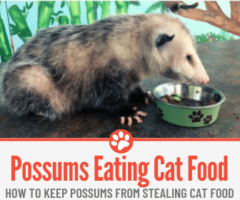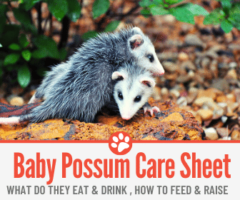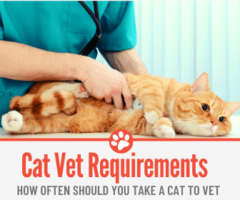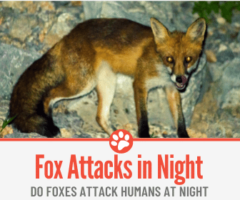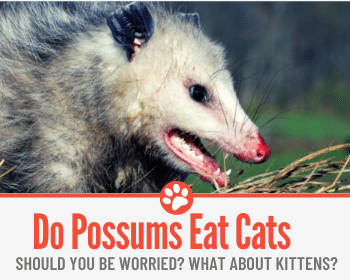 My parent’s cat has recently developed a taste for wild rabbits. While I feel sorry for the furry creatures, I’m glad she’s the one doing the catching and eating. But what about other creatures like possums (technically opossums) that live around my parents’ house?
My parent’s cat has recently developed a taste for wild rabbits. While I feel sorry for the furry creatures, I’m glad she’s the one doing the catching and eating. But what about other creatures like possums (technically opossums) that live around my parents’ house?
Do possums attack cats? Are possums dangerous to cats? To find the answer, I did some research to discover if a possum will attack a cat and what other problems this North American marsupial might pose to our feline friends.
Do Possums Eat Cats?
No, possums do not eat cats. Although theoretically a possum can kill a cat, it would be very unusual for a couple of reasons which I will explain here
First, cats are not part of their normal diet which includes a large variety of food. Also, most likely, possums do not eat cat poop. Although possums are known to eat almost anything, they probably do not eat other animals’ or their own feces.
Rabbits and dogs are the more famous creatures who do. Instead, possums’ usual diet consists of fruits, berries, nuts, small animals like insects, frogs, rats, and even poisonous snakes, as well as garbage—not cats. In fact, cats are more commonly the ones that kill possums and possums often stay away from places that smell of cats or dogs.
Second, possums are not vicious animals.
They are usually quite shy and will not attack a cat or another animal unless they are provoked, cornered, or are competing for food. Even still, the most common response of a possum that feels threatened is to show their teeth and growl or play dead.
Read also: Do Possums Eat Cat food
Do Possums Eat Kittens?
So possums don’t normally kill adult cats, but what about young kittens? Fortunately, the answer is also no.
Possums do not typically eat kittens. Again, it is certainly possible for a possum to kill a kitten, but this would be rare. If you are worried about your young kittens, keeping them inside at night is a good solution since possums are nocturnal creatures and are only active at night.
Actually, cats are often more in danger from other wild animals besides possums, such as coyotes, snakes, cougars or scorpions. For this reason, it’s best to keep your cats in a safe, monitored environment or at least keep them inside at night.
Do Possums Carry Diseases Dangerous to Cats?
Even though they won’t eat your cat, possums can be dangerous to cats since they may transmit diseases. These creatures are known to carry several diseases such as leptospirosis, salmonella, tularemia, and tuberculosis.
Cats could pick up a disease from a possum by coming in contact with their feces and urine or their dead carcass. The best way to prevent your cat from contracting a disease from possums is to keep them away from these animals and their leavings.
Also, always be sure to make sure your cats are up-to-date on their vaccinations. Take your cat to the vet regularly and if you suspect your cat might be sick.
Is Rabies a Disease that Possums Can Pass to Cats?
Fortunately, possums, unlike other small animals such as rats and racoons, are usually safe from one especially frightening disease: rabies. Scientists believe they are resistant to rabies most likely because of their unusually low body temperature.
However, they are sometimes mistaken for having rabies when they open their mouths and hiss and drool. This is actually just a tactic to scare off predators.
When hissing, growling, and drooling doesn’t work, possums play dead.
Contrary to popular belief, possums are not actually pretending when they play dead. Their body goes into shock and they involuntarily collapse for a period that can last up to four hours.
What About Fleas and Ticks?
Possums can carry parasites like fleas and ticks, although these are the same creatures that also live on cats and dogs. Possums actually eat most of the tick that land on them. Because of this, possums may contribute to preventing the spread of Lyme disease.
You should always make sure your cat is treated for both ticks and fleas. You can do this by using treatments such as a flea and tick collar or flea and tick shampoo.

